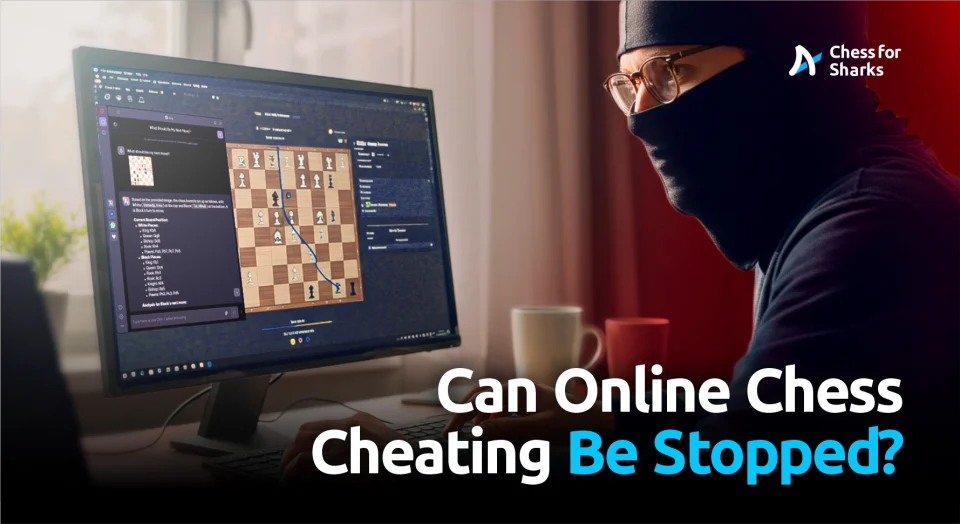Cheating has always haunted chess, but the digital age has made it more complicated. Online chess brought excitement, convenience, and global access, but it also opened the door for cheating.
From casual players running a chess engine on their phones to organised rings of cheaters in prize tournaments, the problem has persisted for some time now.
So the question remains: can online chess cheating really be stopped? Let’s take a deeper look.
How Online Cheating Usually Happens
When chess moved online, players gained easy access to powerful chess engines.
These engines could calculate millions of moves in seconds. The engines made learning chess much easier, but they also birthed a dark monster.
Once players discovered the potential of these engines, the less honorable ones began using them to gain unfair advantages during games.
Cheating is not just about opening a computer on the side. It has many forms, and they include:
- Using Stockfish or other engines to suggest moves.
- Getting help from another stronger player sitting nearby.
- Using hidden devices like smartwatches or phones.
- Even “sandbagging,” where players deliberately lose games to drop their rating for easier wins.
This variety makes cheating hard to stop completely.
Cheating is not limited to casual players. In some instances, even grandmasters have been caught cheating.
The Efforts of Major Platforms
Recognising the negative impact of cheating on the chess community, online chess platforms have implemented robust anti-cheating systems.
Let’s look at the biggest names.
Chess.com

Chess.com is the largest online chess site. They use a mix of technology and human review.
Their detection tools compare a player’s moves with engine suggestions. If a player’s moves consistently match engine accuracy, suspicion rises.
They also track behavior patterns, like how quickly someone plays hard moves.
Cases that appear suspicious are reviewed by a team of experts. Every month, Chess.com bans thousands of accounts for cheating, including some titled players.
From January to March 2025, Chess.com’s Fair Play team banned about 3,500 accounts daily for fair play violations.
This translates to approximately 105,000 account closures per month for cheating.
They also recently launched their Proctor app to serve as a browser which detects cheating patterns and enables surveillance by live proctors.
Lichess

Lichess, the free open-source platform, also has a strong anti-cheating policy. It uses its own detection algorithms to spot engine-like play.
Since it is open-source, many developers contribute to improving its detection methods. This community-driven model keeps the platform adaptive and effective.
FIDE Online Arena

FIDE’s official online platform also actively battles cheating. Since it’s directly tied to FIDE titles and ratings, integrity is crucial.
The Arena combines engine detection with fair-play monitoring by arbiters. They sometimes even request video supervision for high-stakes games.
The Cat-and-Mouse Problem
Even with these measures, cheating continues. Why? Because cheaters adapt.
As detection tools become more advanced, cheaters become increasingly creative.
Some now use “hidden earpieces” or “mouse click patterns” to get signals from helpers. Others try to mimic human play to avoid suspicion.
This constant battle between detection and new cheating tricks is why the problem feels endless.
New Methods of Stopping Online Chess Cheating
Stopping cheating completely may be impossible, but new ideas bring hope.
AI-Based Behavior Tracking
Platforms are now using AI not only to check moves, but also playing style.
For example, if a player suddenly improves far beyond their usual level, the system notices.
Camera and Screen Monitoring
In top online tournaments, players are sometimes required to keep cameras on.
Some events even ask players to share their screen to prove they are not running engines.
Statistical Models
Advanced statistics can detect unlikely accuracy streaks. If a player with a 1600 rating plays at 2700 strength, something is wrong.
Physical Supervision
For serious online tournaments, arbiters may watch players in real time, just like in over-the-board chess.
Can Cheating Ever Be Fully Stopped?
This is the big question. The honest answer is: probably not completely.
As long as technology exists, someone will try to misuse it. But it can be controlled enough to keep the game fair for most players.
Online chess is like any sport. Cheating may never disappear, but strong rules and enforcement will help reduce it.
Platforms are already banning thousands of cheaters every month, which keeps the majority of games clean.
The real solution may not lie in technology alone. It also lies in chess culture. Players need to value fair play.
Communities should continue to shame and reject cheating. If chess loses its spirit of honesty, no technology will save it.
Final Thoughts
Cheating has become the dark cloud over online chess.
But thanks to powerful detection systems, constant innovation, and community pressure, it is not winning.
Will it ever disappear completely? Likely not. But the balance is shifting.
The cheaters are always running, and the platforms are always catching up.
As long as chess players and organizers stay united, fair play will remain stronger than any trick.







join the conversation